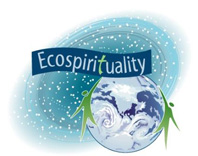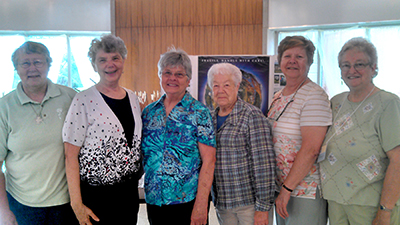Ecospirituality: Sisters of the Earth conference-The new Emerging Humanity, Healing in Wholeness
 by Sister Betty Daugherty
by Sister Betty Daugherty
We seem to sense that something is pressing to be born within the human community. What is it? A new vision is demanding our attention. Will we see it? Will we let it inspire us?
A response to these questions is desperately needed. Not just any response. Only one springing from passion will be strong enough—passion for sustainability, an intense passion for the future of life on Earth.
 One group committed to addressing these issues is known as Sisters of Earth, a network of women with concerns for today’s ecological and spiritual crises. Members, who come from all corners of the United States, Canada and beyond, gather every other year to support one another in the great work of healing the human spirit and restoring life’s support systems.
One group committed to addressing these issues is known as Sisters of Earth, a network of women with concerns for today’s ecological and spiritual crises. Members, who come from all corners of the United States, Canada and beyond, gather every other year to support one another in the great work of healing the human spirit and restoring life’s support systems.
At the Sisters of the Earth conference held in July at the University of Saint Mary in Leavenworth, Kansas, sisters and affiliates explored the theme The New Emerging Humanity: Healing into Wholeness. I was joined by Sisters Karen Flottmeier, Lucy Slinger and Joann Gehling, and affiliates Shirley Huhn and Carolyn Klein.
Women attending the conference represented many religious communities, each with unique commitments. We heard from the Sisters of Loretto who helped organize a grassroots movement to resist a proposed pipeline through what they call their holy land of Kentucky. The pipeline would transport liquids such as ethane, butane and propane to the Gulf Coast for shipment overseas, a process the community opposed out of concern for environmental safety and reverence for Earth. Their commitment led them to deny surveyors access to their lands. Their respect for their neighbors led them to build positive relationships that will support a long-time commitment to future efforts in sustainability.
Another community, the Franciscan Sisters of Mary of St. Louis, Missouri, belong to a group of impact investors, those who make investments that are both sound financially and have a measurable environmental impact. This small and diminishing community has invested heavily in companies and organizations that promote energy efficiency and renewable energy. Their decisions will help to reduce the production of greenhouse gases and advance sustainable land use.
Other presenters focused on questions such as:
- Who provides moral guidance in decisions involving ecological issues?
- What is the role of religious communities in promoting a viable cosmology?
- How can we help to build the spiritual transformation needed to go forward?
FSPA ecological advocate, Sister Lucy Slinger, presented a paper on Environmental Advocacy: Ways to Impact, as a method to engage people, especially those with differing views. She discussed effective ways to help people move out of old paradigms and enter into radically new ways of seeing the world as a place of the sacred. Sister Lucy explained how effective advocacy can be carried out through a variety of methods: boycotting unethical practices; supporting individuals and groups working on environmental issues; and promoting conservation practices, political action, legal action and eco-management.
These four days, filled with prayer, ritual, presentations and conversation, helped to clarify major issues and deepen resolve to continue working together in collaboration through this time of rapid and fluid change.
We were reminded there are new and radical ways to perceive the world. Some of us will embrace the changes that lie ahead, some of us will resist them, and some of us will not see them. Bridges will need to be built. Transformations will be required.
And the questions will remain: What is pressing to be born? Are we ready?


